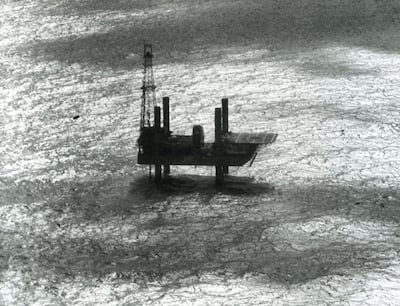In the beginning it was pearls, the sea’s bounty that brought work for many and great fortunes for a few.
Pearls from the Arabian Gulf were desired all over the world, from the Mughal jewellery workshops of India to the necks of European aristocracy.
The collapse of the industry in the 1930s, caused by the Great Depression and the arrival of cheap Japanese cultured pearls, caused economic hardship.
People made what living they could, sometimes by drying fish on the sand to sell as fertiliser. Mostly they existed by subsistence, with hunger never far away. Many left to find work elsewhere.
Oil saved the day. Suddenly, the UAE was wealthy beyond imagining, with the decades that followed the first exports in the early 1960s a time of unprecedented economic growth when villages became towns and towns turned into cities.

Streets filled with imported cars and the new shopping malls rushed to stock all the major international brand names.
As the UAE's economy grew, so did home-grown enterprises.
Dubai Dry Docks is an example. Opened in 1983, it has repaired thousands of ships, but also built dozens of projects, many for the offshore oil and gas industry, including a floating crane capable of lifting 2,000 tonnes.
Even earlier is the aluminium plant visible to anyone who has driven along the Sheikh Zayed Road.
Established in 1975 as Dubai Aluminium, it began production four years later with an official opening by Britain's Queen Elizabeth II during her state visit to the UAE in 1979.
In 2019, the company celebrated its 40th year of production, now supporting 60,000 jobs and renamed Emirates Global Aluminium after merging with Emirates Aluminium in 2013.
Another home grown success story is RAK Ceramics. Founded in 1989, the company is one of the largest ceramic companies in the world, even if many international consumers may not realise RAK stands for Ras Al Khaimah.
Even names associated with foreign brands can actually carry the “Made in the UAE” label.
Dubai Refreshment Company was set up in 1959, and more than 60 years later produces millions of cans and bottle of soft drinks from Pepsi Cola to Lipton Iced Tea and Aquafina water.
Just down the road, the Nestle plant in Jebel Ali turns out more than a billion KitKat bars each year, a production line that started in 2010 and includes Quality Street chocolates, Maggi Products and Nido powdered milk.
In the past two decades, the name of the game has been diversification, moving the country’s economy away from oil and gas and creating a skilled Emirati workforce, supporting thriving local industries.
Some are large, like Strata, founded by UAE investment company Mubadala in 2009 in Al Ain.
It is a manufacturer of world-class aviation components and continually expanding, even in the past year as a supplier as medical grade masks in the fight against the coronavirus.
Almost half the Strata workforce are young Emirati women.
Precision manufacturing is also key to the success of Caracal, founded in 2007 and named after the wildcat.
Caracal pistols are the first to be designed and made in the UAE. As well as supplying the Armed Forces they are exported.
A very different product comes from Camelicious, which harnesses one of the country’s most important natural resources – camel's milk.
Originally a research laboratory in Dubai examining the benefits of camel's milk, Camelicious now makes a range of products that include long life milk and ice cream, sold even in British supermarkets.
Separately, Al Nassma produces chocolate bars made using camel's milk, while Chocodate has shared another UAE secret with the world by taking dates and coating them in chocolate.
In Ajman, Italian Dairy Products uses milk from Emirati cows to produce authentic mozzarella, while last year W Motors broke ground on a Dh370 million ($101m) manufacturing facility that will focus production of its Lykan supercars in Dubai Silicon Oasis.
The future will extend to even more cutting edge technologies. Al Yah Satellite Communications, another Mubadala project offers satellite TV and internet to dozens of countries, but thanks to an agreement with last month Tawazun Economic Council, will develop advanced satellite and communication technology – and truly a global reach for Made in the UAE.










